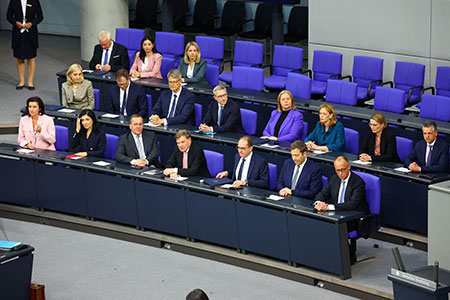
Germany’s ruling “grand coalition” is facing a severe internal crisis that threatens its stability, sparked by a contentious disagreement over the country’s 150-year-old abortion law. A recent report in Stern magazine has brought the deep-seated conflict to the forefront, questioning whether the alliance between the conservative CDU/CSU bloc and the Social Democrats (SPD) can survive the dispute.
The immediate flashpoint was the coalition’s failure to appoint new constitutional court judges before the summer parliamentary recess. The conflict centered on a candidate nominated by the SPD, who, despite being endorsed by Chancellor Friedrich Merz, was rejected by members of his own CDU/CSU faction. As the judicial appointments were presented as a package, the rejection of one nominee blocked all three, creating a political stalemate.
While Chancellor Merz initially downplayed the incident, the SPD has dug in its heels, demanding a new vote on their rejected candidate. The escalating debate has revealed that the core of the problem lies not just with the nominee herself, but with a fundamental disagreement over the interpretation of the coalition agreement, specifically regarding the reform of Paragraph 218 of the German Criminal Code.
This controversial law, which has been part of Germany’s legal framework since the nation’s unification in 1871, technically bans abortion. In its current form, it permits the procedure only if the mother’s life is at risk or in cases of rape. While the law is rarely enforced for other cases, as many women travel to neighboring countries for the procedure, the SPD is pushing for its complete abolition as part of the coalition deal.
The judicial candidate at the center of the storm, 54-year-old law professor Frauke Brosius-Gersdorf, was a key architect of the SPD’s push to repeal the law. Her well-known liberal views have long drawn criticism from conservative and Catholic circles, which hold significant influence within the CDU/CSU and vehemently oppose abortion.
A resolution appears distant. Chancellor Merz has publicly stated he will not compel his party’s parliamentarians to vote against their principles on this matter, framing it as a vote of conscience. This stance makes it highly unlikely that the SPD’s candidate will be confirmed or that the historic abortion law will be repealed in the near future.
Beyond the political and ethical dimensions, the debate carries significant financial weight. Abortions that are currently legal are covered by Germany’s mandatory public health insurance, costing between 500 and 800 euros per procedure and amounting to tens of millions annually. If Paragraph 218 were repealed, the public insurance system could face an overwhelming financial burden from covering all abortions, potentially leading to proposals for means-testing or increased insurance premiums for the entire population.
This ongoing turmoil is taking a direct toll on the government’s standing. According to recent polls cited by the magazine, public dissatisfaction with Chancellor Merz’s performance has climbed to 56%, with only 30% approving of his work, casting a dark cloud over the coalition’s future.
